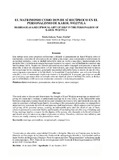El matrimonio como don de sí recíproco en el personalismo de Karol Wojtyla.

View/
Date
2015-11-30Author
Palabras Clave
Matrimonio, Personalismo, Don recíproco, Amor conyugalMarriage, Personalism, Reciprocal gift, Conjugal love
Metadata
Show full item recordAbstract
Este trabajo tiene como propósito reflexionar y difundir el pensamiento de Karol Wojtyla sobre el matrimonio, como don de sí recíproco de un varón y una mujer; para comprender al matrimonio en su realidad auténtica, como la unidad indisoluble entre un varón y una mujer, fundamentada en la decisión libre y voluntaria de amarse hasta que la muerte los separe, con la finalidad de constituir una familia plena y feliz. Según este filósofo personalista en el amor conyugal está presente el amor de atracción, el amor de concupiscencia y el de benevolencia, que exige una donación total recíproca del ser personal de los cónyuges, generando una unidad indisoluble hasta la muerte de uno de ellos, cuya exigencia consecuente es la fidelidad y la fecundidad. Concluyéndose que solo esta forma de concebir y vivir el matrimonio implica un respeto a la dignidad de la persona, que exige ser amada por sí misma y que nunca debe ser tomada como un objeto de placer o utilidad. Por tanto, se deduce que la infidelidad y el divorcio son totalmente contrarios a la norma personalista.
Collections
Información Adicional
| Otros Títulos | Marriage as a reciprocal gift of self in the personalism of karol wojtyla. |
| Correo Electrónico | nestela@usat.edu.pe |
| ISSN | 1690-3226 |
| ISSN Electrónico | 2244 - 842X |
| Resumen en otro Idioma | This work aims to discuss and disseminate the thought of Karol Wojtyla on marriage as mutual selfgiving of a man and a woman; to understand marriage in its true reality, as the indissoluble unity between a man and a woman, based on free and voluntary decision to love until death do you part, in order to constitute a full and happy family. According to this personalist philosopher in conjugal love attraction love is present, the love of concupiscence and benevolence, which requires total reciprocal self-giving of the personal spouse, creating an indissoluble unity until the death of one of them,whose requirement is consistent fidelity and fecundity. Concluding that only this way of thinking and living marriage implies a respect for the dignity of the person, who demands to be loved in himself and should never be taken as an object of pleasure or utility. Therefore, it follows that infidelity and divorce are totally contrary to the personalistic norm. |
| Colación | 112-121 |
| Periodicidad | Semestral |
| País | Venezuela |
| Institución | Universidad de Los Andes |
| Publicación Electrónica | Academia |
| Sección | Academia: Antropología y Teoría del Personalismo |





